- Home
- Edmund White
Our Young Man Page 13
Our Young Man Read online
Page 13
Lazlo was persuasive and showed reproductions of the blank paper Dalí had pre-signed, and he handed to the judge copies of papers on Dalí that Andrés had written for Rutgers. He argued that Andrés repented his misdemeanors now but that committing them had been so tempting because he was a desperately poor grad student who received nothing but free tuition and a $10,000 stipend in return for teaching three undergraduate sections of an art history lecture course.
The Scot took up each of Lazlo’s arguments; Lazlo had to translate, in a whisper, his brogue into ordinary English. The Scot said that Andrés had lived perfectly well on his stipend for two years and hadn’t even taken out a student loan. That he was a good student only made his forgery all the more reprehensible; he had diabolically used his Dalí expertise to facilitate his crimes. It was Dalí’s choice to exploit his own name. If he wanted to sell his signature, that was his right and far from an argument in favor of legalizing the forgeries of a greedy, cynical interloper.
The judge found Andrés guilty and handed down a sentence of three years in prison without parole. He said that Andrés’s crime was worse than that of his dealers (who’d been sent to prison for two years) precisely because of his skill and intelligence—and the training he’d received from a state-supported university. He’d learned how to forge works of art at the expense of the American taxpayer.
Guy noticed that the little judge seemed very jingoistic and Guy wished he hadn’t engaged a lawyer with a foreign accent and name, and he wished he hadn’t spoken to Lazlo in French. Americans could be very paranoid. They’d chosen a trial by judge over a trial by jury because Lazlo had thought the technicalities of the case would baffle ordinary citizens, but then again, maybe a jury would have pitied Andrés’s obvious youth and inexperience.
Andrés turned white when his sentence was read out, and he was immediately handcuffed and taken off by two policemen. Guy had foreseen a moment when they’d embrace, but that didn’t happen. Andrés was just led away. Guy turned to Lazlo and said, “That’s it? No more bail? He’s gone for good?”
Lazlo smiled a sad little apologetic smile. “Of course we’ll appeal.”
“On what grounds?”
“That the sentence is unreasonably harsh.”
“Do you think the judge hated us because we’re foreigners?”
Lazlo looked up through his bushy eyebrows and said, “No. Because you’re homosexuals. Handsome homosexuals. These Jewish family men are like that sometimes.”
Guy thought of Fred’s vicious sons, but then he remembered Lazlo himself was Jewish, and he seemed friendly enough.
Lazlo told him not to worry and hailed a taxi. Guy was suddenly alone at eleven in the morning in an unfamiliar part of town.
He took a cab home. This was the first warm day of April after a long and difficult winter. The pear trees on his block were budding, though they were the kind that never bore fruit. Sterile trees. New York trees.
He picked up yogurt and fruit at a deli. Lucie was coming over for lunch in an hour. The shopkeeper was friendly in a routine way—today, dailiness seemed obscene, an outrage when he thought of his poor Andrés in prison just for loving him too much.
It felt empty, the day felt bruised, the light looked vacant and assaulted, his street felt at once familiar and strange, as if he were seeing it after a hundred-years’ sleep. It was seldom he thought of himself as a single individual, whirling lonely through space, an unnoticed neural event pulsing somewhere in a minor, dimming universe, but today he felt alone and tiny and powerless.
He called his mother, which he did so seldom that he had to tell her right away that nothing was wrong, that he was just checking up on her, did she like her new Opel. He wanted to tell her about the terrible thing that had just happened to him but of course he couldn’t, she’d never understand, he’d have to explain too many things going back too many years, so he ended up consoling her all over again for her husband’s death. Because the telephone call and the renewed condolences were so unexpected, his mother sounded abashed and overly grateful, which left him feeling all the more empty when he hung up.
At least Lucie was warm and comforting. She held him as he told her about Andrés and they cried together. She was so fragrant and kind and gentle that he felt, guiltily, the shocking stirrings of desire. He never wanted to feel excited ever again, not over anyone. The very thought struck him as disloyal. Lucie sensed his discomfort and made popcorn and began to play with his hair, seriously considering if he’d look good with the wet look. She begged him to let her experiment. He could always just wash it out.
7.
With great regularity Guy intended to visit Andrés in prison and Fred in the hospital and felt perpetually guilty, as if he were responsible for their separate but horrible destinies. The first time he saw Andrés shorn and pale and skinny in his orange jumpsuit, he was thunderstruck. His arms looked so thin and helpless, his bald spot was gleaming, his face seemed to have sprouted five new moles, with the bad food he appeared to have grown a horrible little belly—not really! It was just a fold in his prison clothes. Guy could have slapped himself for the disparaging thought.
That afternoon, after he sat beside Fred and held his hand for fifteen minutes, Guy walked over to the Sheridan Square gym. All the rituals of his life had become so stale—and the perpetual guilt made him angry! He didn’t want to feel like a bad person who brought disaster to everyone around him. He was listless with self-hatred and an irrational anger that could never find a rod to strike but idly played across the surface of his mind. As he trudged upstairs to the second floor and the gym’s open door, he could smell the old sweat, hear the melancholy ring of dropped barbells, and he prepared himself to see those mastodons with their stained gym clothes, pockmarked faces, and neck veins about to pop.
But when he breached the entrance he saw identical blond twins, teenagers, maybe Finns like those models on the fold-out cover of L’Uomo Vogue. After Guy changed, he worked out near them so he could study them. They cheered him up. It was amusing to certify that they were identical down to the tiniest detail—the blond fuzz on their calves; the pointy nose that swerved to one side, thinned out, and turned red near the tip; the long eyetooth that gleamed with saliva; the bulging shoulder blades under identical crisp T-shirts with an unfamiliar logo—shoulder blades like unsprouted wings. They both touched their toes at the same moment and, as their T-shirts rose up, Guy could see identical black moles staining the intricately turned carpentry of their white, white waists. They were just as much mirror images in their behavior, murmuring to each other, exchanging fractional nods of encouragement, one bending to tie the laces of the other, but everything unemphatic. They were like gods posing as shepherds.
Their eyes lingered on Guy for an instant as if the camera, panning across his face and body, got stuck. It was such a slight hesitation as almost to go unremarked, but they both must have noticed Guy had intercepted their glance, because both boys blushed deeply, charmingly. A blush for them was nearly a cardiac arrest. Guy feared they’d faint due to the sudden concentration of blood. What did they see that instant when they looked at him? Compared to their freshness, he was wilted, lined, thick. Only in New York, where everyone was thirty-something, did he appear young. People had agreed he was young, as if by consensus. It was an article of faith. But these twins’ skin was so fine-pored, so rosy; their arms were so firm, nothing was flabby, there was nothing ropy about their necks; they were dramatically thin but not starved-looking. They looked healthy. They hadn’t been on diets. Their heads were too large for their bodies but their features were still small, neat, like entries written in a copperplate hand. The skin fit as neatly as a lady’s glove on their long fingers, not a bit of sag or jiggle or looseness.
The twins must have been so embarrassed by the shared blush that they studiously ignored Guy for the rest of their workout and skipped their shower and hurried off still in their sweaty shorts. Guy thought they might be models, very young models, an
d he wished he’d seen them naked. They must live nearby.
That night he talked to Pierre-Georges. It was a relief to speak in French—he got all of Guy’s allusions and shorthand and his muted sort of bitchiness. “Do you think Americans are vulgar? Like peasants?”
“Don’t insult our poor peasants,” Pierre-Georges said loftily.
“So you think French peasants are better than typical Americans?”
“You’ve been here too long to be able to say ‘typical.’ There are all kinds of Americans.”
“But they’re crude,” Guy protested. “They talk so loud and sprawl. There’s nothing tidy about them. They’re materialists—nothing spiritual or cultured.”
“Don’t forget you’re from Clermont-Ferrand, not Auteuil. People sprawl in your département. What’s gotten into you?”
“Why are we here in this awful country?” Guy wailed. While Pierre-Georges paused for him to elaborate, Guy collapsed under the weight of everything, his life, this country. Finally Pierre-Georges said in a soft, consoling voice, “Put on your new cashmere blazer and I’ll take you out to the Casa De Pré, you always liked that one.”
“What will we talk about?” Guy asked plaintively.
“Écoute,” Pierre-George said, vexed or pretending to be. “Listen—you’re exaggerating. I’ll see you there in thirty minutes. Don’t keep me waiting.”
“Forty-five?”
They ordered comfort food, a risotto with spring vegetables and a fruity bottle of Vouvray. Pierre-George sent the bread and butter back: too tempting. “Are you very sad about Andrés?”
Guy stared at Pierre-Georges and then just nodded gravely. Finally he said, “My life is such a mess. I thought it was supposed to be glamorous and enviable. That’s what Interview said about me: glamorous, enviable. That’s what After Dark said in its last issue in 1982: ‘Gay, glittery, and glamorous.’”
“Only you remember that,” Pierre-Georges said sourly.
“Yes, I’m sad. Crushed. I hate this country, with its puritanism and heartlessness and filthy diseases.”
“And that’s all Reagan’s fault, I suppose?”
“Whose?” Guy asked, genuinely not recognizing the name.
“Flute!” Pierre-George lisped. It amused him to sound like a flustered French matron and to use out-of-date genteel swear words. “You honestly don’t know who the president of the United States is?”
“Oh. Her!”
“They’re going to revoke your green card.”
“Good! I can’t stand it here another day.”
“Why?” Pierre-Georges asked. “People here think you’re some sort of Norman aristocrat with a chateau. In France no one would be fooled. Just look at how you hold yourself at table.”
Guy stopped slumping and sat upright. “Who cares about all that?” he asked.
“French people do. If you go back you’ll have to deal with all that. Here you can reinvent yourself. And this is where the money is—important now that you’re in your sunset years. How long have you been in the business?”
That night in bed Guy surprised himself because he was happy to be alone. He loved Andrés, he really did. No one had ever been so devoted to him. Guy realized that his way of measuring someone’s devotion was a feminine aspect of his nature; only women wanted men who were devoted. Men wanted men and women who were hard to get. But he’d given himself entirely to Andrés; he’d never been so immersed in another man. But that night when he masturbated he didn’t think of Andrés in his orange jumpsuit and bald spot. No, he imagined he was between the identical twins, that their bodies were as smooth as the alabaster lamps he’d seen once in Volterra. The boys were clambering over him in his fantasy like Sherpas on the slopes, everything coordinated between them. He fell asleep and dreamed they were all swimming together in some sort of low-ceilinged turbulent pool fed by hot springs. The boys were slippery as eels and in his dream one penis exploded in his anus and the identical penis flooded his mouth. Guy smiled in his sleep.
The fall menswear collections were being shown next week in Milan and Guy had a go-see with the new Armani representative in New York. It would be the usual cattle call. Guy could picture it all now, the way the boys, these angular giraffes, would be coiffed backstage with curlers and blow dryers, how makeup artists would swoop around them, highlighting their cheekbones (which already looked ready to explode through their skin), drawing bluish shadows under their heavily kohled eyes, retracing their lips with a vampirish color stick, and then the clothes, the sacred clothes, so much more important than the people wearing them, would be taken out of their sealed and numbered dry-cleaning bags. The boys would be lined up in their preposterous boots and leggings and velvet vests and jewelry, and the designer would fix each boy, spray a curl in place, unbutton a shirt one notch, turn up a collar, like an anxious chef standing at the kitchen door and arranging with greasy fingers the roast chicken to advantage before the grand presentation. They were all just chicken breasts under white sauce and bewigged with parsley.
The thought of trotting down the runway one more time as the buyers plied their paper fans against the stifling heat of the overhead lights and the bad but trendy rock music blared forth and the excited assistants applauded while the giraffes swarmed the runway for the finale and the modest couturier wore a shockingly conventional dark suit from Savile Row as he humbly took his bow, looking like a CEO or politician, a member of a different species from the models, and blew a kiss toward the buyer from Barneys—that prospect repelled Guy. He didn’t want to go. Luckily the Armani representative didn’t choose him; he told Pierre-Georges that Armani wanted more “ethnics” this year for his safari collection. Pierre-Georges was depressed, then frightened. “It’s the beginning of the end. We’re too old.” Guy noticed the diplomatic “we.”
Marty sent him the fully executed deed to the Fire Island house. That day, when Guy visited Fred, he thanked him again and offered him the chance again of leaving it to his sons.
“Why?” Fred asked. “They’ve never been out there and would be scared to go. That’s where we were the happiest. It’s sacred to us.”
Fred’s arms, torso, face, were covered with black spots—KS. Luckily, he couldn’t see; he could nurse his illusions, with Guy’s help, that finally he was an A-list gay. Fred kept drifting off, but then he sat up with a sudden urgency: “There’s a new test at last to see if you’ve got the virus. Guy, I want you to take it, pronto. I know you’re very careful, whatever that means, but you’ve got to take care of yourself. I’d hate to think I’d given it to you. Promise you’ll take the test.”
“Can I do it right here in the hospital?”
“You bet.”
“What’ll I do if I’m positive? Who will take care of me?”
“Andrew?”
Guy reminded him that Andrés was in prison.
“Peter?” Fred said, meaning Pierre-George.
For a while Fred rambled on about Rock Hudson and how he’d “popularized” AIDS. “I wonder if those French doctors can help him. Imagine renting a private jet to take him to Paris—that must have set him back an arm and a leg.” Guy didn’t understand the reference to an arm and a leg—was he just raving? Amputation fantasies?
Suddenly Fred’s attention concentrated and he asked almost slyly, “If you do have AIDS, have you thought who you’d leave the house to? My mother used to say, ‘Never leave your jewelry to someone who doesn’t have someone you know to leave it to—you don’t want some distant cousin of your friend to end up with your stuff.”
Guy said he was leaving everything to his own mother.
Fred smiled. “There’s a good boy. She’d need it if you died.”
Then Fred started talking disjointedly about his mother, long since dead.
When the neurologist came by, a German with an accent, a white beard, and a stomach, he made cheerful comments to his team and to Fred, who didn’t exactly seem to know who he was. He was leading six neurology residents on rounds a
nd he invited one young woman to examine the patient. She hammered Fred’s elbows and knees with a mallet and looked at his eyes and tongue and poked him with her gloved hands. She asked him about his stool. She then said to her professor, “The patient shows signs of increased CMV infection, though reflexes remain stable. The liver is not hypertrophied. Patient’s cognitive functions seem disoriented.” The professor thanked Fred for cooperating—and suddenly they were all gone, leaving behind an audible silence.
“Sounds bad, huh?” Fred asked.
“About the same,” Guy said with placid reassurance. “They were all so earnest.”
“What was that about cognitive functions? Have I become dim-witted?”
“Not at all.” Guy was angry that the resident had discussed Fred in front of him. He felt certain that would never happen in France—another example of American barbarism.
At the gym that evening he didn’t see the twins, but the next day they were there. He was determined to speak to them, if only to ask something like when they’d be finished with the barbell. One of them left early, which seemed odd. The one who remained came right up to Guy and said, “You look familiar.”
“I wish I could say the same,” Guy replied with a smile.
The adolescent had a confused look in his eye but a brave, radiant smile on his lips as if he were determined to be in on the joke, mysterious as it might be. It was the same mixture of confusion and courage Guy had seen on the faces of the deaf.

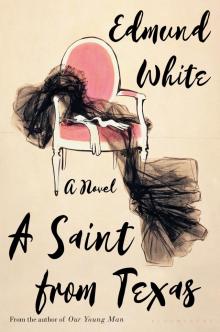 A Saint from Texas
A Saint from Texas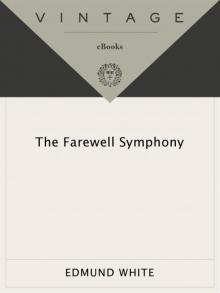 The Farewell Symphony
The Farewell Symphony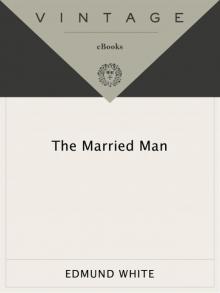 The Married Man
The Married Man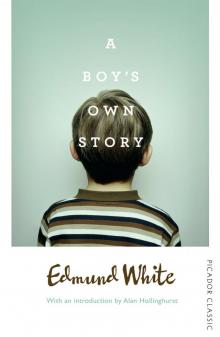 A Boy's Own Story
A Boy's Own Story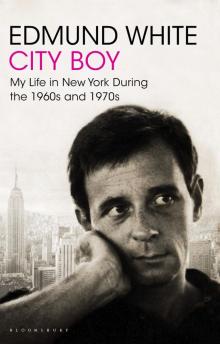 City Boy
City Boy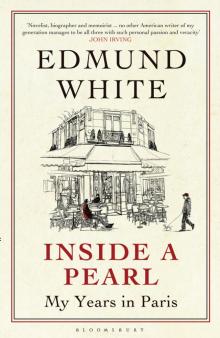 Inside a Pearl
Inside a Pearl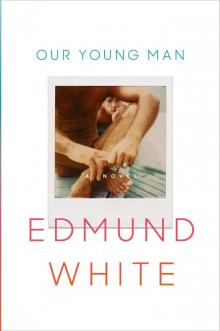 Our Young Man
Our Young Man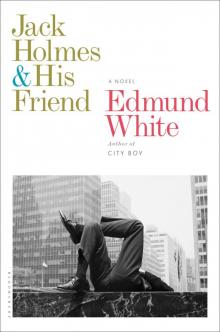 Jack Holmes and His Friend
Jack Holmes and His Friend